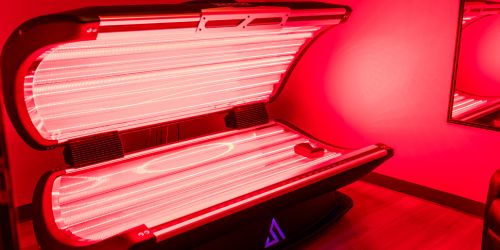Concussions are a common occurrence in athletics. It is an issue that can impact everyone from young athletes still in school to seasoned professionals at the height of their careers. We now know more about the long-term impact that concussions can have on athletes physically, cognitively, and emotionally, and the focus has turned to providing treatments that can improve the health and well-being of those who become injured while playing sports.
At LaserLab, we offer unique and innovative treatments for patients who receive concussions in sports using the Summus Laser. All of our treatments are provided in an environment that is designed to further the healing process of athletes coping with injuries.
Understanding Concussions
Concussions are a type of traumatic brain injury (TBI) that can happen when the head receives a blow or some other type of impact. This can occur as a result of a fall, a collision, or sports-related activities that involve sudden movement that shakes the brain or causes it to jolt, bounce, or twist. This can lead to chemical changes and damage or stretching of the brain cells.
While concussions aren’t often life-threatening, they can lead to serious symptoms. Because the brain is the command center of the body, controlling thoughts, movements, memories, and more, even a mild concussion has the potential to disrupt normal brain function.
What Are the Different Types and Levels of Concussions?
Grade 1: Mild Concussion
The first type of concussion is the mild concussion. With this type of concussion, the patient does not lose consciousness after the blow or injury and symptoms last for less than 15 minutes. During these 15 minutes, the patient may experience a headache, dizziness, or confusion.
Grade 2: Moderate Concussion
The next level of concussion is moderate concussion. This type of concussion is characterized by symptoms that last longer than 15 minutes but that do not come with a loss of consciousness. The patient may have problems with balance and coordination and may have difficulty remembering the event that caused the concussion.
Grade 3: Severe Concussion
A severe concussion involves loss of consciousness that may last a few seconds, a few minutes, or longer. Symptoms that come with a severe concussion can include amnesia, confusion, dizziness, and changes in personality or sleep patterns.
What Are the Symptoms of Concussions?
The symptoms of concussions are placed in four different categories:
1. Physical
The physical, or somatic, symptoms of a concussion are sometimes the easiest to identify following a concussion. They can include:
- Headache or pressure in the head
- Dizziness or “seeing stars”
- Ringing in the ears
- Nausea or vomiting
- Blurry or double vision
- Sensitivity to light or noise
- Balance problems
2. Cognitive
Cognitive symptoms are those that interfere with a person’s thinking and mental functions. They can include:
- Feeling mentally foggy
- Difficulty thinking and concentrating
- Problems with memory and remembering new information
- Confusion and feeling slowed down
3. Emotional
Emotional (affective) symptoms can lead to changes in the person’s mood or behavior. They can include:
- Irritability or getting angry easily
- Sadness or depression
- More emotional than usual
- Nervousness or anxiety
4. Sleep
Changes in sleep patterns can also occur after a concussion. They can include:
- Sleeping more than usual
- Sleeping less than usual
- Having trouble falling asleep
- Feeling tired or having no energy
The Short and Long-Term Impact of Concussions
Athletes are often put in a unique position because they may be subjected to more concussions and other injuries than the average person. Repetitive head trauma in sports can lead to chronic traumatic encephalopathy, or CTE, which is a degenerative brain disease often found in athletes or others with repetitive brain trauma.
In addition to some of the short-term impact of concussions such as many of the symptoms discussed above, concussions can lead to long-term struggles with depression, irritability, and aggression, as well as cognitive impairment, long-term sleep-related issues such as insomnia, impaired judgment, and a host of physical symptoms. This highlights the importance of proper treatment and management of concussions to help improve the short and long-term health of athletes.
Summus Laser Treatments: A Cutting-Edge Solution for Concussion Therapy
At our clinic, we use the Summus Laser to help athletes heal from sports-related head injuries. This laser is a high-powered Class IV laser that can be completely customized to treat both children and adults who are suffering from a concussion. The Summus Laser can help reduce inflammation, regenerate tissue, improve blood flow, and promote recovery. It can be a revolutionary option for those seeking treatment for head trauma in sports.
Our Approach to Concussion Treatments
We have a comprehensive and customized approach to concussion treatments. With each treatment, you get the full LaserLab experience, which includes revitalizing aromatherapy, stress-relieving music, comfortable adjustable tables with face cradles for use during treatments, oxygen-infused rooms, red light therapy beds, stim machines, and more. The aim is to promote full body relaxation and stress relief to further your healing after a sports-related head injury.
Following an injury, we may recommend a course of treatments ranging from every day to several times per week depending on the nature and severity of your injury. We offer treatment plans to make this process as easy as possible for you.
Treating Concussions and Other Sports Injuries
To determine whether our Summus Laser treatments at LaserLab™ are suitable for treating your concussion, you can make an appointment with us to discuss your injury and your symptoms. We look forward to helping you quickly regain health after your injury. You can schedule your consultation today by contacting us online.


